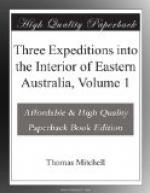The Barber was retaken, but his gin or native wife who had facilitated his escape then proceeded, as is supposed, to the tribes beyond Liverpool range. He was conveyed to the hulks at Sydney and, having been tried and condemned, his sentence was finally commuted to banishment to Norfolk Island where he remained from 1832 to 1835. He was then sent to Sydney with a party of expirees (or prisoners whose sentences of banishment to that island had expired). The Commandant of Norfolk Island had then reported to the Governor of New South Wales that amongst these expirees was “a man named George Clarke, who, according to private information he had received, intended some injury to Major Mitchell.” This was communicated to me, and I at length recollected that this might be George the Barber, whose life I had been in some degree the means of sparing. He wrote me a letter, couched in the most grateful terms, and in which he offered to accompany me, if permitted, on my expedition into the interior (in 1835) and which proposal I was inclined to accept, and indeed made application through Colonel Snodgrass for this man, as one of my party, but Sir Richard Bourke appreciated his offer much more judiciously, as events proved, and sent The Barber to Van Diemen’s Land, where he was soon after hanged. He was undoubtedly a man of remarkable character, and far before his fellows in talents and cunning; a man who, in short, under favourable circumstances, might have organised the scattered natives into formidable bands of marauders.
...
APPENDIX 1.2.
REPORT FROM LIEUTENANT ZOUCH, MOUNTED POLICE, RESPECTING THE DEATH OF MR. CUNNINGHAM.
Bathurst, December 7, 1835.
Sir,
I have the honour to state that in conforming with the instructions contained in the Colonial Secretary’s letter of the 16th of October, together with your orders directing me to proceed to the interior for the purpose of ascertaining the fate of Mr. Cunningham, I proceeded with the party on the 24th of October for Buree, which place I left on the 29th, accompanied by Sandy (the black native mentioned in my instructions). On the 2nd November I fortunately met with two blacks who knew the particulars of a white man having been murdered on the Bogan, also the names and persons of the perpetrators of the deed; they likewise offered to accompany the police to where the tribe to which the murderers belonged were encamped; I accordingly took them as guides, and on the evening of the 6th they informed me they could see the smoke from fires of the Myall blacks—on the borders of a lake called Budda. On arriving on the banks of the lake we found a tribe encamped, consisting of upwards of 40 men, women and children, all of whom we succeeded in making prisoners, without any resistance on their part. Having questioned them as to the murder of a white man, they acknowledged to one having been killed on the Bogan by four of their tribe, three of whom they delivered up, the fourth they stated was absent on the Big river. On searching the bags of the tribe we found a knife, a glove, and part of a cigar case which the three blacks acknowledged they had taken from the white man, and which Muirhead* said he was sure belonged to Mr. Cunningham.




